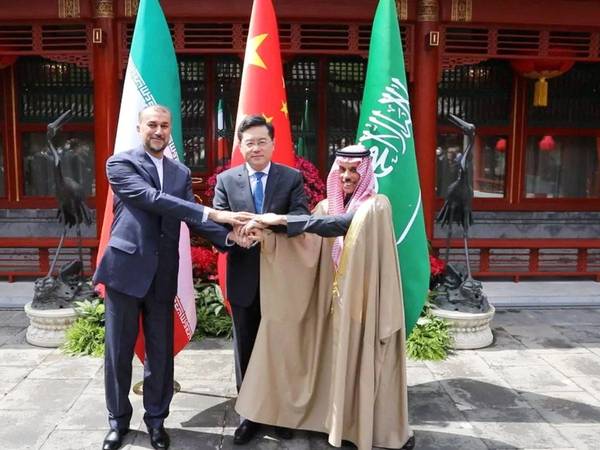Tehran media had observed a shift in the attitude of Iranian officials toward Saudi Arabia, before the deadly Hamas attack on Israel, lavishly praised by the regime.
Didban Iran [Iran Monitor] website noted the inconsistency in the behavior of Iranian officials last week, comparing their friendly presence at the Saudi embassy to the provocative placement of a bust of former IRGC Quds Force Commander Qasem Soleimani in Esfahan's main football stadium where a the Saudi Ittihad team was scheduled to face an Iranian team within the frameworks of the AFC Champions League earlier this month.
The website also noted state-owned media outlets, such as the ultraconservative daily Kayhan, adopted a less-than-friendly approach. The Khamenei-linked daily's editor Hossein Shariatmadari wrote in a strongly-worded commentary after the match was cancelled that "Iran should ban any match between Iranian and Saudi teams anywhere in the world." Shariatmadari further criticized Foreign Minister Hossein Amir-Abdollahian for not announcing such a ban.
According to Didban Iran, the shift in behavior was not limited to state officials as some Revolutionary Guard commanders, members of the Iranian parliament, state-owned media and revolutionary institutions have also appear to have changed their friendly rhetoric toward Saudi Arabia. The website noted that these are the same officials, media outlets and state organizations that seven months ago praised the Tehran-Riyadh rapprochement as "the Raisi administration's miracle."
The website recalled that Kayhan had said seven months ago that "Iran has achieved the rapprochement with Saudi Arabia from a position of power." The daily had called the resumption of Tehran-Riyadh ties "a slap in the face of the United States and Israel." However, on Saturday, the Kayhan threatened Saudi Arabia, stating that " the revolutionary organizations will confront you if you approach Israel."
The website quoted a deputy commander of the IRGC as saying that "relations with Saudi Arabia will be desirable if they can save the Palestinian nation." This comes while earlier, Yahya Rahim Safavi, a former IRGC commander who is currently Supreme Leader Ali Khamenei's top military adviser had said that "renewing ties with Riyadh has brought about an earthquake for the US hegemony in the region."
Didban Iran also highlighted the change of tone of members of the Iranian parliament about Saudi Arabia following the incident in Esfahan. Generally, the website accused Iranian politicians and military commanders of having double standards about Saudi Arabia.
Khabar Online website last week characterized the shift in the approach of Iranian hardliners as "renewed attempts to disrupt relations between Iran and Saudi Arabia." It also noted that Iranian hardliners made it clear they detested Amir-Abdollahian's attempt to prevent a new tension between Tehran and Riyadh and started a new round of attacks on him.
In another development, former moderate conservative lawmaker Mansoor Haqiqatpur told Nameh News website: "Iran has called the renewing of ties with Saudi Arabia a strategic agreement. But does Saudi Arabia see the rapprochement in the same way? Or Riyadh bought some time to facilitate China's trillion-dollar investment in the Saudi energy sector?"
Haqiqatpur opined that by demanding the removal of Soleimani's bust, "Al-Ittihad disrespected Iranian people's values and Soleimani's status." He further called on the Iranian government to take a clear stance about the matter and say whether what happened was a mistake by Iran or Saudi Arabia.
Responding to this question will not be easy in Iran's volatile political situation, particularly because the question has been framed in a way to leave the ultraconservative government speechless in front of its political rivals.
